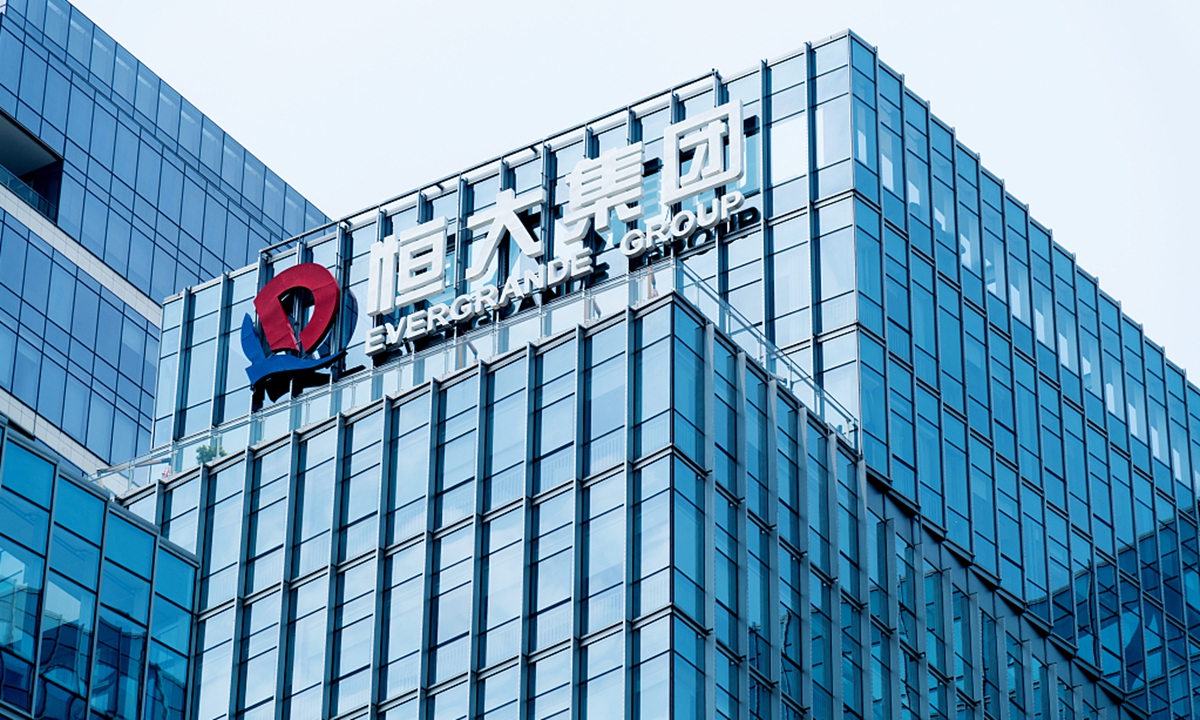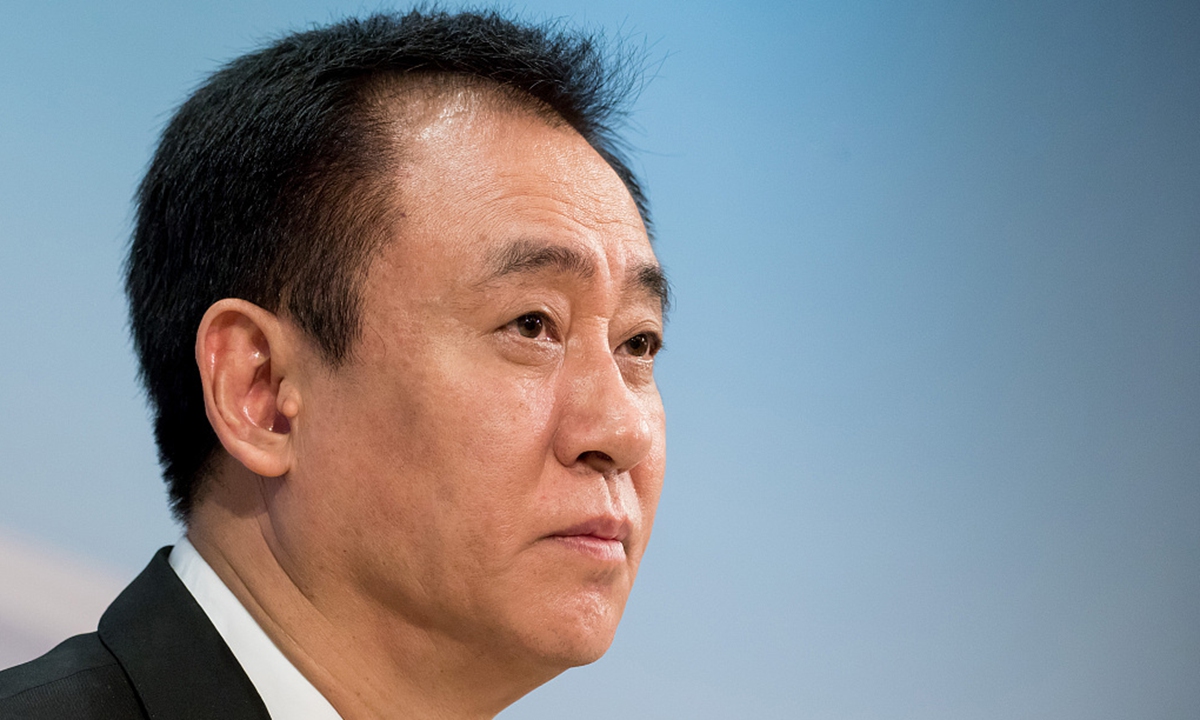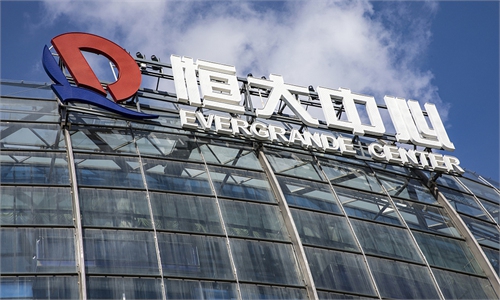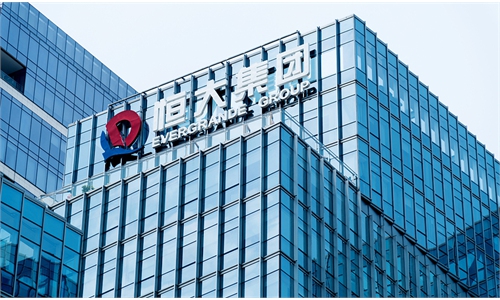Three Chinese regulators offer reassurance of overall controllability after Evergrande summoned over debt warning

Evergrande Group Photo: CFP
South China's Guangdong provincial government summoned the heavily indebted China Evergrande Group late Friday, after the Shenzhen-headquartered property developer warned earlier in the day that it may fail to meet its financial obligations.
Shortly after the news, three major Chinese financial regulators, in rare simultaneous remarks, moved to reassure the markets that the Evergrande issue is an individual case and should not be a concern for the country's capital market and housing market.
In a filing with the Hong Kong stock exchange on Friday, Evergrande said that it received a demand to perform its obligations under a guarantee in the amount of about $260 million. "In the event that the group is unable to meet its guarantee obligations or certain other financial obligations, it may lead to creditors demanding acceleration of repayment."
Not long after the warning, the Guangdong government disclosed that it was highly concerned about the Evergrande issue and that it had summoned the company for talks.
At the request of Evergrande, in order to effectively defuse risks, protect the interests of all parties and maintain social stability, the Guangdong government agreed to send a working group to Evergrande to urge the company to promote risk disposal, strengthen internal control management and maintain the company's normal operation, read a statement published by the Guangdong provincial government on Friday.

Xu Jiayin Photo:VCG
Xu Jiayin, or Hui Ka Yan, the founder of Evergrande, has sold personal assets in his latest efforts to meet company obligations. Xu sold 1.2 billion shares in the company on November 27, worth HK$2.68 billion ($344 million) in total.
But Evergrande still failed to pay coupons totaling $82.5 million due on November 6, which kept investors in suspense to see if the company can meet its obligations before a 30-day grace period ends on Monday, December 6.
Regulatory reassurance
In rare simultaneous announcements, the People's Bank of China (PBC), the country's central bank, the China Banking and Insurance Regulatory Commission (CBIRC), and the China Securities Regulatory Commission (CSRC) all moved to reassure the markets that Evergrande is an individual case and does not represent the wider situation.
The risks at Evergrande mainly stem from its own poor management and blind expansion. Short-term risks faced by individual housing enterprises will not affect the normal medium- and long-term financing function of the market, the PBC said in a late-night question-and-answer session on its website,
"Recently, domestic real estate sales, land purchases, financing and other behaviors have gradually returned to normal. Some Chinese real estate companies began to buy back overseas bonds, and some investors also began to buy US dollar bonds of Chinese real estate companies," said the PBC statement.
The authorities will continue to maintain communication with relevant regulatory authorities in overseas markets and urge overseas bond issuers and their shareholders to strictly abide by market discipline and rules, properly handle their debt problems in a market-based and legal manner, and actively fulfill their statutory debt repayment obligations, according to the central bank.
Relevant departments will provide support and facilitation for enterprises to remit funds to repay and repurchase overseas bonds under the existing policy framework, the PBC revealed.
The PBC remarks indicate that there has been no major deterioration in the housing market and the emergence of risks associated with certain developers can be attributed mostly to their excessive expansion, Yan Yuejin, research director at Shanghai-based E-house China R&D Institute, told the Global Times on Friday.
The CBIRC said that Evergrande's failure to fulfill its guarantee obligations remains an individual case, which "will not have any negative impact on the normal operation of China's banking and insurance industry."
The financial debt accounts for about one-third of Evergrande's total debt, with a relatively scattered structure and a small amount of financial investment.
In a similarly toned statement, the CSRC said that the spillover effects of the Evergrande incident on the capital market are under control.
At present, the A-share market is generally stable with strong resilience and activity. The operating financial indicators of listed companies and bond issuers related to housing are generally healthy, according to the securities regulator, and it will continue support for the reasonable and normal financing of real estate enterprises.
Despite the reassuring tone from the three major financial regulators, it was also considered a wake-up call for real estate firms to take the debt issue seriously. It is likely that Evergrande will be facing stricter supervision, Yan commented.
"Evergrande's announcement indicated an inadequately serious attitude to the situation, which could have a negative influence. That's why it was summoned," he said.
In the Friday filing, Evergrande stated that "in light of the current liquidity status of the company, there is no guarantee that Evergrande will have sufficient funds to continue to perform its financial obligations."
Property firms, as Yan suggested, need to take advantage of the gradual return to normal with home sales, land purchases and fundraising - thanks to the pro-growth policy tailwind - to genuinely resolve their debt risks.



